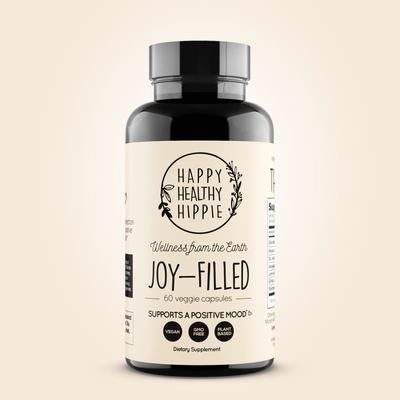
You might know vitamin D as the sunlight vitamin that we need to keep our bones healthy.
But did you know about the link between vitamin D and hormone balance? In fact, despite its name, vitamin D is in itself a prohormone.
You probably have a ton of questions. What is a prohormone? How does our body produce it? How exactly are vitamin D and hormone balance related?
That’s exactly what we’ll be covering in this guide.
Read along to find out:
- What Is Hormone Imbalance?
- How Does Vitamin D Help With Hormone Balance?
- Other Ways to Balance Your Hormones
- Frequently Asked Questions
What Is Hormone Imbalance?
Hormones are the vital chemicals that control many of the body’s vital functions, including reproduction, growth and development, heart rate, metabolism, sleep cycles - the list goes on.
In this regard, our body needs hormonal shifts to carry on. For example, after a meal, your pancreas produces insulin to regulate your fats, carbohydrate, and protein levels. Similarly, when you’re dealing with a stressful situation, your adrenal glands produce cortisol to increase glucose in the blood, as a response to the stressor.
These are all healthy hormone fluctuations that you don’t even notice in your daily life.
It’s when there is an imbalance (too much or too little) of a specific hormone, that you experience hormone imbalance symptoms.
These symptoms can be light at first, such as a slight headache or bloating. If left untreated, though, they can become more intense and cause trouble sleeping, low libido, unexplained weight changes, and fatigue.
How Does Vitamin D Help With Hormone Balance?
By definition, vitamin D is a prohormone that the body produces naturally when it’s exposed to sunlight. Let’s break down what all of that means.
A prohormone isn’t a hormone itself, but a substance that your body converts into a hormone.
So, when the sun hits the skin, the body makes vitamin D (the prohormone) through a chemical reaction. Then, the liver and kidney convert vitamin D to an actual active hormone known as calcitriol, which helps the body absorb calcium and keep our bones healthy.
And we’re just getting started with the benefits of vitamin D for hormone balance.
Ever felt like your mood depends on the amount of sunlight you get a day?
That’s because researchers have found that vitamin D protects us from running out of serotonin, and helps regulate the production of adrenaline, noradrenaline, and dopamine in the brain. Hence, the higher the vitamin D levels, the lower an individual’s risk of depression. The same goes for obesity - people with a vitamin D deficiency, are more likely to be obese.
One study also shows a link between vitamin D and a woman’s estrogen levels. Low levels of vitamin D may lead to lower estrogen levels, which can cause mood swings, headaches, depression, hot flashes, and more.
How To Get Vitamin D
There are three main sources of vitamin D: sunlight, certain foods, and supplements.
The sun is the number one source of the nutrient. Staying for 10 minutes under the midday sun is equivalent to 10,000 units of vitamin D.
Certain foods are also good sources of vitamin D. They include:
- Salmon
- Red meat
- Liver
- Egg yolk
- Calcium-fortified foods like cereal, orange juice, and oatmeal
Yet, the sun remains by far the best way to boost vitamin D levels. These few foods don’t have more than 200 IU per serving, at best.
Now, if you don’t have the opportunity to get enough sunlight or eat food that can provide vitamin D, we recommend taking vitamin D supplements.
Usually, 10 milligrams a day (or 4,000 IU) are enough for most people. Anything more can be harmful.
Other Ways to Balance Your Hormones
There are many additional ways to reinforce the positive effects of vitamin D for hormone balance. They include:
- Daily exercising reduces your stress hormones and stimulates the production of endorphins, which boost your mood, sex drive, and overall mental health.
- Maintaining a nutrient-rich diet filled with protein, fiber, and healthy fats. Some hormone-balancing foods you can try out include avocado, flaxseeds, sweet potatoes, bell peppers, and probiotics. If you want to learn more, we’ve got a guide on how to create a hormone balance diet you can check out.
-
Taking vitamins and hormone balance supplements. Some of our top supplement recommendations for hormone balance include:
- Joy-filled soothes anxiety, uplifts your mood and energy, and relieves any tension in the mind and body.
- Go With The Flow has been shown to promote mental and emotional relaxation, and reduce hormonal physical symptoms such as acne, bloating, and tenderness.
- Organic Maca is well-known for treating menopause symptoms and improving fertility, a healthy reproductive system, and libido.
- Besides vitamin D, other vitamins that can help balance your hormones are vitamin B3, B6, E, and vitamin K2.
Frequently Asked Questions
#1. Can Vitamin D Cause Hormone Imbalance?
Vitamin D functions as a hormone in the body. It helps regulate adrenaline, dopamine, and serotonin production in the brain.
Therefore, yes, a lack of vitamin D can cause hormone imbalances. Symptoms you’ll typically notice include depression, hot flashes, and mood swings.
Learn more about the different symptoms of a hormone imbalance by heading over to our guide on the 10 most common signs of a hormone imbalance.
#2. Does Vitamin D Raise Estrogen Levels?
There’s not one straight answer to this question, as several studies point to different findings.
One study found a “positive correlation” between vitamin D and estrogen levels. Women with lower amounts of vitamin D tended to have lower estrogen levels, whereas those with higher amounts had more estrogen in their system.
A recent study, however, disagrees, linking high levels of vitamin D to lower estrogen levels. Women were given extremely high doses of the vitamin (as much as 24,000 IU a week) and experienced a 3% decrease in their estrogen levels.
#3. Can Vitamin D Cause Irregular Periods?
No, vitamin D doesn’t cause irregular periods. Rather, it has been shown to regulate ovulation and reduce pain.
So, to reduce menstrual symptoms you should take supplements of vitamin D and calcium, and spend time outside in the sunshine.
#4. What Does Vitamin D Deficiency Cause?
The most common risks associated with vitamin D deficiency include:
- Muscle pain
- Bone weakness or bone loss
- Hair loss
- Fatigue
- Depression
- Increased risk of death from a cardiovascular disease
#5: How Much Vitamin D Do I Need?
The amount of vitamin D you need depends on numerous factors: age, gender, ethnicity, sun exposure, season, and more. During the winter, for instance, getting vitamin D is more important than any other season, as we’re exposed to more infections and spend most of our time indoors.
Hence, there’s no way to give an entirely accurate answer that suits each group.
With this being said, the general vitamin D recommended intake is at 400–800 IU per day, or 10–20 micrograms.
Joy-Filled is a 100% plant-based supplement that supports you by:
- Relieving Daily Stress and Tension in the Mind and Body
- Soothing Anxiousness and Worries
- Uplifting Mood and Energy
- Healing Ingredients include Ashwagandha & Ginkgo Biloba
Try it risk free with our 60-Day Money Back Guarantee.
Key Takeaways
Now you know everything you need about vitamin D and hormone balance.
Let us go through some of the main points we covered:
- Vitamin D is linked with hormone balance, that’s why it’s important to get the right amount.
- Vitamin D deficiency can lead to lower estrogen, serotonin, and dopamine levels, which gives you a higher chance of depression, obesity, and cardiovascular diseases.
- The best way to make sure your daily vitamin D dose: dedicate 10 minutes of your day to sitting in the sunlight and soaking in the rays.
- If you can’t take vitamin D naturally, supplements are the best way to make sure your body has the right amount.
Related Articles
- Hormonal Imbalance in Women [Causes & Treatments]
- 4 Estrogen Dominance Symptoms [Spot & Fix Them]
- High Estrogen in Women [What Causes It & How to Fix It]


